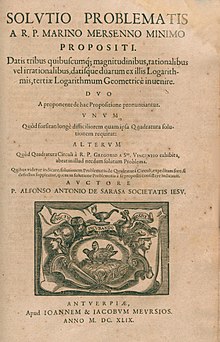Alphonse Antonio de Sarasa
Alphonse Antonio de Sarasa (* 1618 in Nieuwpoort , † 1667 in Brussels ) was a Flemish mathematician . He is considered to be the discoverer of the decadal logarithm ; However, this discovery is partly attributed to the Flemish Jesuit Grégoire de Saint-Vincent , whose pupil and later colleague he was. De Sarasa published, among other things, ars semper gaudendi (“The art of always being happy”).
life and work
Sarasa came from a Spanish family and worked as a preacher in Anvers and in Brussels. He became known through his book Ars semper gaudendi , which is one of the sources for the Essais de Théodicée sur la bonté de Dieu, la liberté de l'homme et l'origine du mal by Gottfried Wilhelm Leibniz . Sarasa's readers also included Barthold Heinrich Brockes , Christian Wolff , Erhard Weigel and Jean Paul . Wolff raved about the "egregium opus". A German translation by Johann Christian Fischer (1712–1793) was published in two volumes in 1748 in Jena under the title The Art of Always Being Happy and Always Happy . Another German translation was published in Augsburg in 1776 under the title The art of being always happy in all incidents of human life . Translations into Italian (Rome 1836, translator is Antonio Bresciani SJ), French ( L'art de se tranquilliser dans tous les événemens de la vie , four editions) and English ( Compendium of the art of always rejoicing , London 1872, with one Foreword by Thomas Meyrick SJ) are available. The Croatian priest Ignjat Kristijanović (1796-1884) published a translation of the work into Croatian in 1826 under the title Náchin vu vszèh sivlènya dogodyajih vszigdar zadovolynomu biti (The Way to Be Always Happy in All Life ). Johann Christian Fischer also wrote a Latin commentary on Ars semper gaudendi (Jena 1740).
bibliography
- Alphonse Antonio de Sarasa: Solutio problematis a RP Marino Mersenno Minimo propositi , Antwerp, Meursii 1649.
literature
- Corrado Rosso: Un précurseur de la Théodicée: Alphonse Antoine Sarasa . In: Studia Leibnitiana 3 (1971) pp. 136-140.
- Corrado Rosso: Il serpente e la sirena. Dalla paura del dolore alla paura della felicità . Napoli 1972.
- Robert P. Burn: Alphonse Antonio de Sarasa and Logarithms . In: Historia Mathematica 28 (2001) 1-17.
Web links
Individual evidence
- ↑ C. Wolff: Philosophia moralis sive Ethica. Pars tertia, in qua agitur de virtutibus, quibus praxis officiorum erga deum et omnis religio naturalis continetur. Magdeburg 1751. p. 639.
| personal data | |
|---|---|
| SURNAME | Sarasa, Alphonse Antonio de |
| BRIEF DESCRIPTION | Flemish Jesuit and mathematician |
| DATE OF BIRTH | 1618 |
| PLACE OF BIRTH | Nieuwpoort |
| DATE OF DEATH | 1667 |
| Place of death | Brussels |
